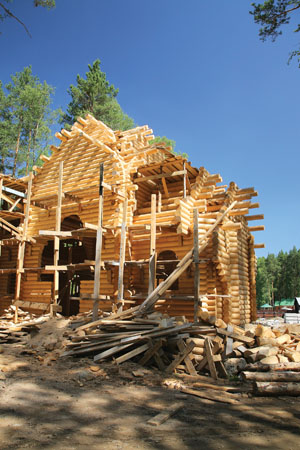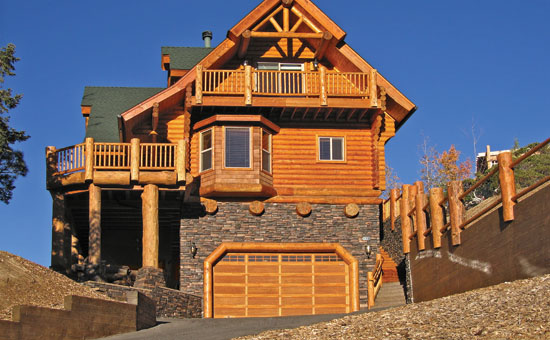There are some do-it-yourselfers out there who take on the task of building their own log home. But the average log home buyer needs to find a builder or general contractor to build it. This person takes all of the package components that you purchase and crafts them into your home. It is a very detailed and meticulous job that requires a true professional with excellent building experience and communication skills. Yet finding this person takes as much research as it did to select the right log home company. “In today’s economy, builders are plentiful,” says Tom Vesce, founder of The Original Log Cabin Homes Ltd. in Rocky Mount, North Carolina. “Prices in labor have come down and the log home buyer is in the driver’s seat with a much better selection.” Here, we offer sage advice from log home professionals to guide you through the options in finding a builder.
Many log home companies offer a network of “builder-dealers.” A builder-dealer is a person who represents a particular log home company and sells their log home packages. The builder-dealer, as the name says, can also build your log home. Be aware that not all dealers are builders, so be sure to check. If you do decide to hire a company’s builder-dealer, it is still necessary to check at least three current references of owners in the area where you will build. Another factor is to make sure that you communicate well with the builder-dealer and that they understand your goals. A good flow of communications can go a long way.
Other log home companies may offer services to assist in finding a builder. One example is PrecisionCraft Log & Timber Homes’ Builder Bid Administration Program, which evaluates qualifying builders for their clients. “This process removes the stress from the buyer over the numerous details involved in selecting an onsite builder,” says Phil Mattison, project manager at PrecisionCraft Log & Timber Homes in Meridian, Idaho.

Bigstock
In any situation, checking references and establishing a good working relationship with a builder is recommended, whether or not they are affiliated with a particular company. “Find someone who is experienced in log home construction by requesting references,” says Tom. “Get a list of customers that the contractor has built for. If they are not able to supply that, look elsewhere.”Phil also recommends meeting face to face with each potential builder. “Assess your comfort level with both their professional nature and personality type,” Phil says. “Most importantly, set up a time to view a few of their completed homes and ask a lot of questions during the walk through.”Another resource to request from your log home company representative is a list of proven local builders and contractors. This will ensure that the builder is familiar with the particular company’s log stacking and building process and has proven themselves to be professionals whom your log producer would recommend. Independent builders also have access to the resources available through the log home manufacturer. “At Jim Barna Log & Timber Homes, we do employ former builders who can provide technical assistance and offer a toll-free number for builders in the field to call and ask questions,” says Shellie Valentine, national sales director of Jim Barna Log & Timber Homes in Oneida, Tennessee. Builders can also take advantage of any construction training available through the log home manufacturer, which is usually at no cost to the builder.The key to having a successful relationship among you, the builder, and your log home company is communications. “A good builder or contractor is also an adviser to the customer; they don’t just swing a hammer,” says Tom. “The customer should utilize them as an adviser along the way.” Tom recommends finding your builder as early in the log home building process as possible. Problems can occur if a builder is not brought on until the log package has been delivered. Use their knowledge during the design phase to resolve questions about everything from window placement to reinforcing floors for a gourmet kitchen. The builder will be able to give advice on how certain things can be done and what the potential costs would be.
Finding a local builder familiar with your area’s special features is also recommended. Because of the vast differences in climate, soil, and geography across the country, a regional builder will be well versed in building requirements for your particular area. “For instance, building on the coast with its potential for hurricanes requires different building codes than if you are building in the mountains,” says Tom. “Regional builders know how to deal with the special requirements.”
Armed with this advice from log home professionals, you are sure to find the right builder to make your log home come to life.

